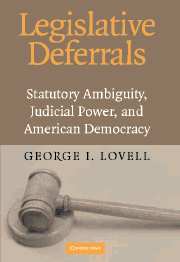Book contents
- Frontmatter
- Contents
- Acknowledgments
- Preface
- 1 Rethinking Judicial Policy Making in a Separation of Powers System
- 2 False Victories: Labor, Congress, and the Courts, 1898–1935
- 3 “As Harmless as an Infant”: The Erdman Act in Congress and the Courts
- 4 Killing with Kindness: Legislative Ambiguity, Judicial Policy Making, and the Clayton Act
- 5 The Norris-LaGuardia Act, for Once: Learning What to Learn from the Past
- 6 Legislative Deferrals and Judicial Policy Making in the Administrative State: A Brief Look at the Wagner Act
- 7 Conclusion
- Reference List
- References
- Index
4 - Killing with Kindness: Legislative Ambiguity, Judicial Policy Making, and the Clayton Act
Published online by Cambridge University Press: 14 July 2009
- Frontmatter
- Contents
- Acknowledgments
- Preface
- 1 Rethinking Judicial Policy Making in a Separation of Powers System
- 2 False Victories: Labor, Congress, and the Courts, 1898–1935
- 3 “As Harmless as an Infant”: The Erdman Act in Congress and the Courts
- 4 Killing with Kindness: Legislative Ambiguity, Judicial Policy Making, and the Clayton Act
- 5 The Norris-LaGuardia Act, for Once: Learning What to Learn from the Past
- 6 Legislative Deferrals and Judicial Policy Making in the Administrative State: A Brief Look at the Wagner Act
- 7 Conclusion
- Reference List
- References
- Index
Summary
This pen with which the President signed the Clayton bill has been added to the collection of famous pens at the A.F. of L. headquarters – trophies of humanitarian legislation secured for the workers of America. This last pen will be given the place of greatest honor – it is symbolic of the most comprehensive and most fundamental legislation on behalf of human liberty that has been enacted anywhere in the world. The Clayton law gives bones and sinews to an academic ideal of freedom – it secures industrial freedom and makes the workers free in thought and in act.
AFL President Samuel Gompers, American Federationist, November 1914, 974It is but declaratory of the law as it stood before.
Justice Mahlon Pitney, Opinion of the Supreme Court on the Clayton Act, in Duplex v Deering, 254 U.S. 443, 470Upon passage, the labor provisions of the Clayton Act were celebrated by the leaders of the American Federation of Labor (AFL) as a landmark reform, the most important legislative victory ever achieved by the American labor movement. Its subsequent failure to achieve its apparent policy goals has been the subject of continual scholarly interest and concern (Frankfurter and Green 1930, 165–73; Jones 1957; Kutler 1962; Bernstein 1960, ch. 4, esp. 209–10; Forbath 1991, 147–58). Because the failure of the labor provisions is directly traceable to the interpretation that the Supreme Court imposed on each of the celebrated labor provisions, the Clayton Act has become one of the central building blocks of the claim that unelected judges reversed gains made by labor through democratic processes in legislatures.
- Type
- Chapter
- Information
- Legislative DeferralsStatutory Ambiguity, Judicial Power, and American Democracy, pp. 99 - 160Publisher: Cambridge University PressPrint publication year: 2003



